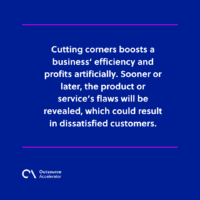The allure of quick success
The artificial intelligence (AI) race is heating up, causing leading firms to cut corners to get ahead of the pack — a concerning trend that has potentially existential consequences.
OpenAI has recently drastically reduced the time and resources it spends on testing the safety of its platform. Safety evaluations that took several months have now dwindled to days. The implications of heavy test expenses, other than time and delay, include costs for external experts and internal engineers, as well as fees for the creation of data sets and computing power.
The $300 billion start-up has decided to automate its evaluation process to trim expenses so it can roll out more products, quicker. However, experts claim that succumbing to competitive pressures is “reckless” and a “recipe for disaster.”
99 problems
Cutting corners is a common but risky practice among businesses. Due to time constraints, resources, and the pressure from the industry and competitors, firms are tempted not just to cut out the fat, but the meat, too. Some use subpar materials, hire unqualified individuals, and skip quality control processes in their quest to remain as lean as possible.
Cutting corners boosts a business’ efficiency and profits artificially. Sooner or later, the product or service’s flaws will be revealed, which could result in dissatisfied customers. Word goes out quickly. One frustrated client could damage the firm’s entire reputation and could snowball into costly legal battles if not handled properly.
In the AI ecosystem, the consequences could be much worse. More and more people are using the new age technology for school, work, and leisure activities. There will come a time when it’ll be difficult to exist without bots. AI platforms will become fundamental building blocks of economies, and AI companies must have the moral imperative to monitor their development down to the T.
AI’s outputs have been a mixed bag so far. While it has helped businesses handle routine customer inquiries, it has shown bias in recruitment. While it has aided firms in forecasting market trends, it has also shown bias and can be sensitive to data breaches. In other cases, the engine uttered racial slurs, which prompted a massive hiring initiative to correct it.
These inconsistent outcomes reveal an inherent malleability that must be addressed in the development stage. OpenAI’s choice to skip the leapfrog safety evaluations could be a cautionary tale in the making. Cutting corners isn’t a wise strategy. It’s a terrible mistake with serious repercussions.
Global talent
The battle for AI supremacy is in full swing, and professionals from all corners of the globe are eager to participate. The talent pool is bigger than ever and is no longer concentrated within Western borders. More and more AI firms are outsourcing tech talent from countries like Kenya, India, and the Philippines to make sure their platforms are functional and safe.
Though available at a 70% discount, diligent professionals from these areas are equally skilled, if not better than, their Western counterparts. In other words, they could empower aspiring AI startups to save on costs but not scrimp on potential. Sourcing globally will allow AI platforms to maneuver around rising expenses and give them that critical competitive edge.
The question for your business
How is your company participating in the AI race?




 Independent
Independent





















